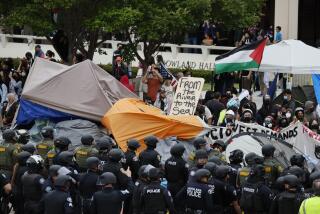Cal State Frats Won’t Be Brats, Will Seek Permits
Seven Cal State Fullerton fraternities agreed Friday to seek city-issued conditional use permits for their houses on the Teri Place Frat Row and in other parts of Fullerton.
The decision broke an impasse that otherwise would have been resolved in court, both sides agreed. The fraternities had said the law on conditional use permits was specifically aimed at fraternity housing and is unconstitutional, while the city would have forced compliance or evicted the fraternities.
Fullerton passed an ordinance two years ago requiring fraternities and sororities to obtain conditional use permits for their houses by Jan. 2, 1988, after continuing complaints from neighborhood residents about noise, litter and parking problems generated by the Greeks. The permits allow houses to exist as long as certain conditions are satisfied.
All six sororities in Fullerton and one fraternity, Delta Chi, have been granted permits to date.
The seven holdout fraternities will now follow the ordinance because the city acted in “unquestionable good faith” in evaluating Delta Chi’s application and granting a permit in November, said Ron Talmo, a Western State University College of Law professor who is the fraternities’ legal adviser.
“There was no longer a distrust for the city,” Talmo said, adding that the Greek wish to avoid conflict.
“We’re going to be here for a long time, and if each of us sued each other, which probably would have happened, it wouldn’t have made for good relations,” he added.
Fullerton City Atty. Kerry Fox stressed that the ordinance was passed not to abolish the houses but to prod the fraternities into becoming better neighbors.
“We never have intended to get rid of them. Our intent always was to work with them,” Fox said. “The fraternities were not being good neighbors, and nobody was pressuring them to be good neighbors, neither the university nor the alumni, and that created a vacuum the city entered with this ordinance.”
The law attaches several conditions to the continued use of the houses, including an “appropriate” number of residents in relation to the property; no generation of “excessive or undue police activity” and full compliance with fire, building and zoning codes.
“It’s a hammer over our heads, that if we screw up out here, we can lose our permits,” Talmo said.
The Greek Alumni Advisory Council announced that the seven fraternities would file for permits by Dec. 15. Although permits cannot possibly be granted before the January deadline, Fox said the city probably won’t take action against the fraternities because they are now acting in good faith to follow the law.
Interfraternity Council president Adam Gerard agreed that the fraternities’ neighborhood relations needed improvement. He said that alumni have recently become more active in guiding fraternities toward “more responsible behavior and trying to be better neighbors.”
The Greeks have again formed a judiciary council, which handles complaints against fraternities and sororities, that will include alumni, he said. The fraternities are restricting the number of parties that may be held in a month and are requiring that party guests park at the university and walk across the street to Frat Row, he said. Party admission tickets will be given to guests when they park, he said.
Sigma Pi member Eric Gustafson, 21, said his fraternity now tells new members to keep their stereos and radios down and to be quieter and more respectful of the entire neighborhood in general.
“The new members who come in our fraternity are told on Day 1 that these are the rules,” he said.
In her home at one end of Teri Place, where most fraternity houses are located, seven-year resident Karen Trosko reserved judgment on how effective the conditional permits or the fraternities’ bids to be more considerate will be.
In a familiar pattern, “the frats get together and have a meeting and say, ‘how can we be better neighbors?’ ” Trosko said.
Then a new crop of fraternity members come in, and the reforms are forgotten, she added.
But she did concede, as did two other area residents interviewed, that the fraternities seem to be trying harder: “It’s gotten better. I’ll give them credit. When we first moved in, it was a war zone.”
More to Read
Sign up for Essential California
The most important California stories and recommendations in your inbox every morning.
You may occasionally receive promotional content from the Los Angeles Times.










